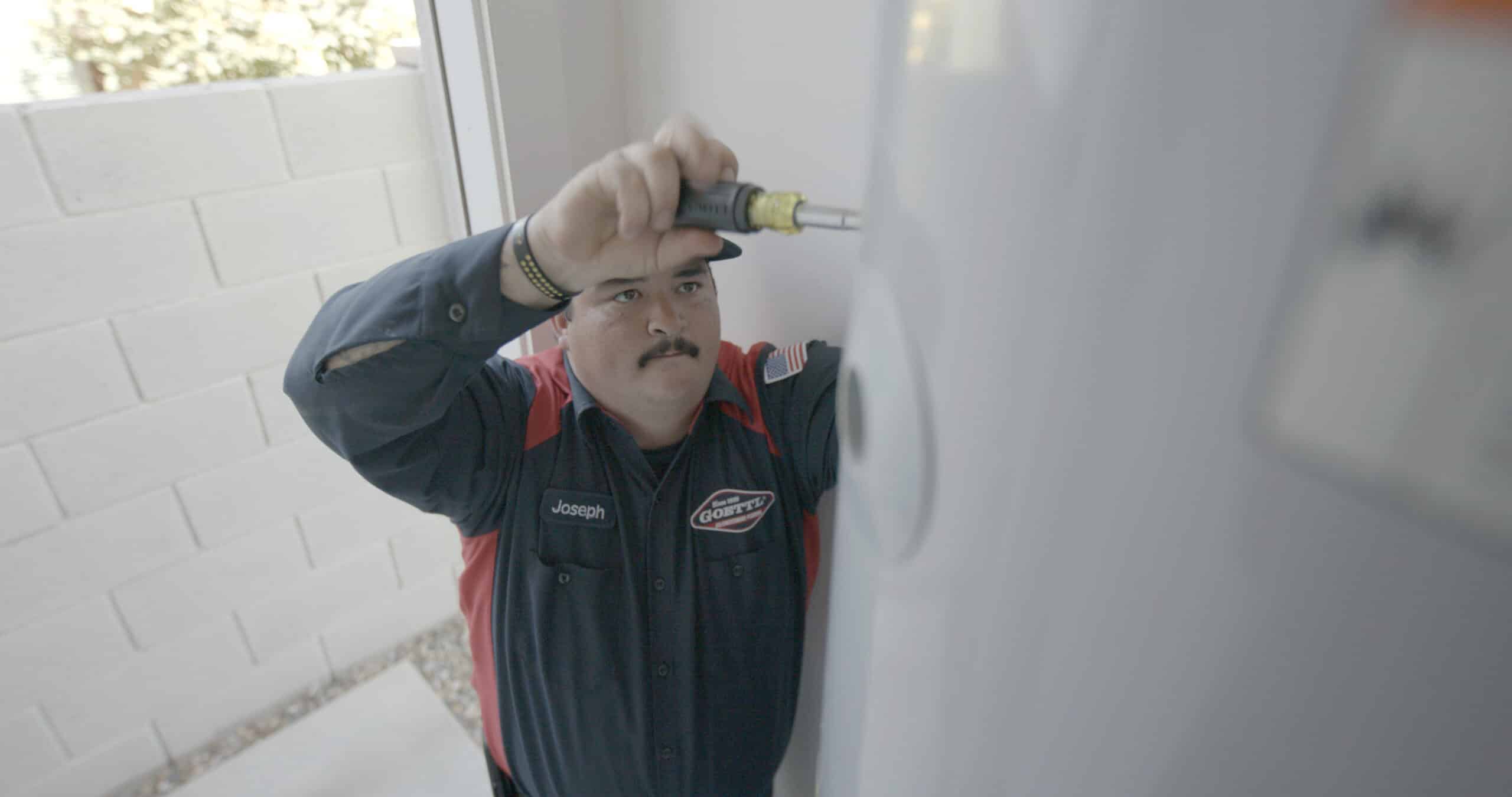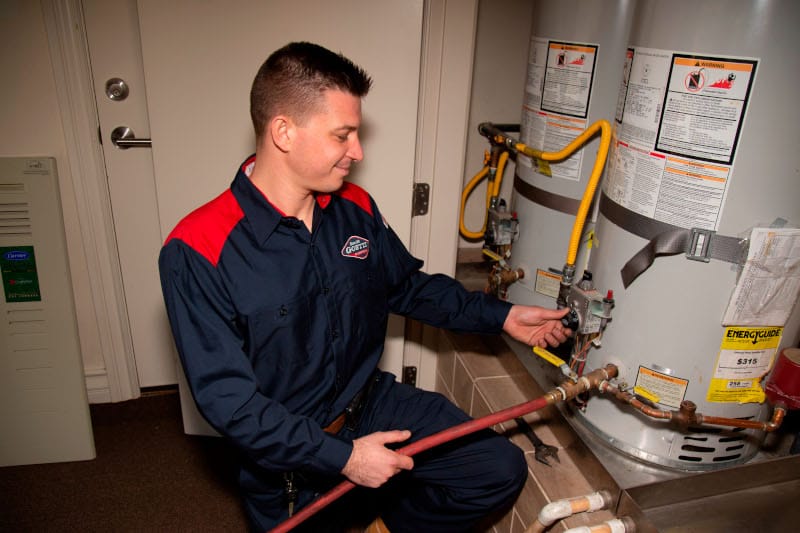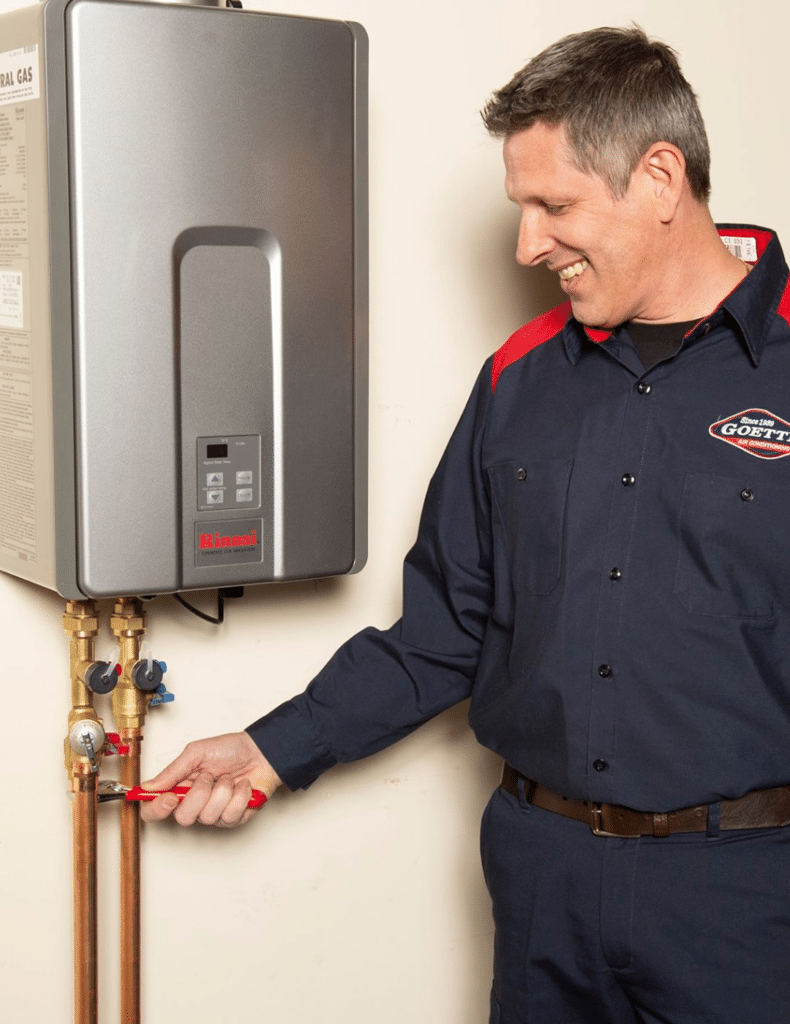
Water Heater Showdown: Tank vs. Tankless
Ah, the joys of hot water! We often take it for granted until our water heater throws in the towel. When it’s time to replace that old, inefficient water heater, you’re faced with a big decision: tank or tankless? Read on as we break down the pros and cons of both options, helping you make an informed choice for your home and family’s hot water needs.
The Tank Water Heater

Let’s start with the classic—the tank water heater. This appliance has been a staple in homes for decades. Here’s what you need to know.
Pros
- Cost-Effective: Tank water heaters are generally more affordable upfront than tankless, making them an attractive choice for budget-conscious homeowners.
- Easy Installation: If you’re replacing an old tank water heater, installing a new one is often straightforward and usually fits into the same space and uses the same connections.
- Reliable: Tank water heaters are known for their durability and longevity when properly maintained.
- Gas or Electric: Get the right fit for your home’s needs with both gas and electric models available. In general, an electric water heater will have a lower purchase price, but a gas system will heat water much faster.
Cons
- Limited Efficiency: These systems constantly heat and reheat water in the tank, even when you‘re not using hot water. This results in energy waste and higher utility bills.
- Limited Hot Water: Once the tank runs out of hot water, you’ll need to wait for it to heat up again, which can be frustrating during peak usage times.
- Space Requirements: Tank water heaters take up valuable space in your home, and if you need more hot water for your household, you’ll need a larger tank, which can be a space challenge.
The Tankless Water Heater

Now, let’s take a look at the more tech-savvy option—the tankless water heater.
Pros
- Energy Efficiency: Tankless water heaters heat water on demand, which means they only use energy when you need hot water. This leads to energy savings and a lower utility bill!
- Unlimited Hot Water: Say goodbye to cold showers! Tankless heaters provide a continuous hot water supply, ideal for households with high hot water demands.
- Space-Saving: Tankless water heaters are compact and can be installed in smaller spaces, freeing up room in your home.
- Longevity: When properly maintained, a tankless water heater can last 15-20 years or more, while a tank water heater’s lifespan averages 8-12 years.
- Gas or Electric: Tankless water heaters also come in gas or electric models to ensure a perfect fit for all home needs. Electric units are, on average, more energy efficient, while gas water heaters tend to be more cost-efficient due to lower costs of natural gas and propane.
Cons
- Higher Initial Cost: Energy Star-certified tankless water heaters can be pricier to purchase and install, but they may pay for themselves over time through energy savings.
- Installation Complexity: Installing a tankless water heater may require changes to your home’s gas or electrical systems, which could increase installation costs.
- Maintenance: While they have a longer lifespan, tankless heaters may require periodic maintenance to prevent scaling and other issues.
Choosing the Right Size
Now that you understand the differences between a tank and tankless water heater, what size is right for you? There are a few key things to consider:
- Number of people in home
- Daily hot water usage
- Types of household appliances
- Local plumbing codes
Learn more in this episode of Goettl Homeowner Tips on YouTube.
Choosing between a tank and tankless water heater depends on your specific needs and budget. If you prioritize lower upfront costs and have space to spare, a tank water heater might be a suitable choice. However, if energy efficiency, unlimited hot water, and saving space are your priorities, then a tankless water heater is the way to go.
Water (heater) you waiting for?
Ready to upgrade your water heater? Contact Goettl today for expert advice and professional installation services. Make the switch to a more efficient and reliable hot water system.
Testimonials
What Our Customers Say About Us
What stood out the most was their attention to detail and genuine care for customer satisfaction. They took the time to assess my system thoroughly, offered honest recommendations, and completed the work efficiently without cutting corners. My home is now noticeably more comfortable, and I feel confident knowing everything was handled by true professionals.
If you’re looking for reliable, top-quality HVAC service, I highly recommend Goettl. They truly live up to their reputation and exceeded my expectations in every way.
Roger came for my rejuvenation appointment. He was very curtious and knowledgeable. I was happy he showed up prompt with great respect to my AC unit and property. I relaly appreciate him and his attention to detail. I would highly recommend him for any of your AC needs.
Jesus Gloria AC service review. He did a great job today and I would highly recommend him for any AC service needs. He was very knowledgeable and courteous. He helped add a surge protector on my outside unit for added protection. I look forward to working with him in the future.
Well, I had some plumbing issues at my residence, and I called "Goettl Plumbing." Great results, too 🤗.
My water wouldn't stay hot, and after contacting Justin at Goettl Plumbing, he sent out Frank, a service technician with over 20 years of plumbing experience. Frank spent a good bit of time studying/ evaluating my plumbing functions, consulted with an on-site Goettl supervisor, and determined my plumbing issues.
After they conferred those issues with Justin, a plan for resolution and payment was determined, and work started the next day.
Greg arrived that morning; accessed the work areas, determined the tools and equipment he needed, and got right to work.
By the end of the day, Greg had installed three (3) Replacement Single Handle Tub/Shower Valves, a Pressure reducing valve, and a Thermal expansion tank with vacuum breaker - - RESULTS: Hot Water 💧
In two days, I witnessed Super Communication, Super Teamwork, and some old-time "1990-1991" Professionalism ... thanks,
"GOETTL Air Conditioning & Plumbing" for A Job Well Done 👏🏼
After note. Cameron came back by a day later to check on readings he wasn't able to get on first appointment. I have high confidence in his work. I'm very likely to work with them again
Brayan and Marcos did an awesome job on the new ac installation. Installed with no issues and has been on ever since. Perfect time with summer coming up. Walked through and job was very clean and organized. Great work ethic. Great guys.
Update - our air conditioner went out today (10/26/23) and JEHAD showed up to repair the issue but the issue was bigger than expected. Tomorrow we will have a brand new system! Goettl is an EPIC firm that treats customers right. Thank you again JEHAD for going above and beyond.
Goettl is the epitome of what excellent customer service is! Our Drain King, DAREAN, addressed all of our questions and concerns and not only unclogged our drain but went above and beyond to show us our drains leading to the street were free and clear of any other issues. Thank you Darean and thank you Goettl for a great experience!
Update: great experience with Edgar Loredo who kept it real with us and was very transparent. I appreciate his honesty and recommendations. Will be requesting him as our technician in the future if we choose to use Goettl
2/15/23
Thank you, Jorge G. Again for being so honest about our unit issues.
Kathy
H. Navarro
Frank Soto, plumber was very thorough in his assessment of the problem. Provided options and was patient in waiting for our decision. We are very pleased with Frank's knowledge plus his warm personality was a plus. Thank you Frank.
H. Navarro
Jeremy Ortega service tech did an excellent job removing, cleaning and reinstalling the flame sensors along with servicing the HVAC blowers. We are set for the next 2 years. Thanks again Jeremy.
H. Navarro
Thank you!
09/19/2024 - Husam Ismail did an outstanding job!!! Very personable and honest, so far with my experience with
Goettl he is the best technician that i have encountered.
02/11/2024 - Josh L. did a fabulous job!!! He was very personable and fast. Great experience, I would recommend Goettl to anyone.
Today is 21 July Sam stopped by and service was excellent 👌. Ralph was excellent, great customer service
Thank you goettl
Explain testing and clarified cost.
I was impressed.
Brayan, Jason, and Christian were the three techs who installed the unit and new ducts. They showed excellent work ethic. They cleaned up all debris, and most importantly, the system works perfectly. Today Ignacio came and inspected the work, and found no problems at all. The entire team has earned 5 stars.
November 6, 2024. The team Brayan, Christian and Jason worked awesome in replacing our whole A/C system and air ducts. They were respectful of our property, answered our questions without hesitation. They all did a fantastic job. We thank ya'll for your services and definitely recommend your business. We appreciate you.
November 7, 2024: Ignacio inspected the newly installed air condition and duct system. He was very knowledgeable, and good expertise. He listened and answered our questions and concerns..he helped us to install our Sensi a/c and heater app..
Fe Alexander
Leticia and Ed Baca
We had an blockage in our sewer line.
Tyler Leija was dispatched the same day, and found the blockage using a camera tool.
He cleared the blockage temporarily.
The actual fix would require digging up and replacing the bad area of pipe.
Paulo "Adrian" Dado and his crew came out the next day with backhoe, dug up the area, and replaced the section of pipe.
The next day, after inspection, Adrian and his crew filled in the hole and then cleaned up the area.
This is a brief description. There was A LOT of work involved.
Very professional work.
Our tech Jorge that came out the day before helped quickly assess the situation and get us set up for a new system and water heater. Jorge was very friendly, would highly recommend!
Frank did an excellent job at explaining every thing in terms that were understandable to both myself and my wife. This greatly assisted in making the right decision to look at all options on either repair or update/purchase for the future and in the long term, saving money.
Will definitely call and use
Goettle again and I will ask if Darrean could help again.
Couldn’t be happier. Came all the options




































































































































































































